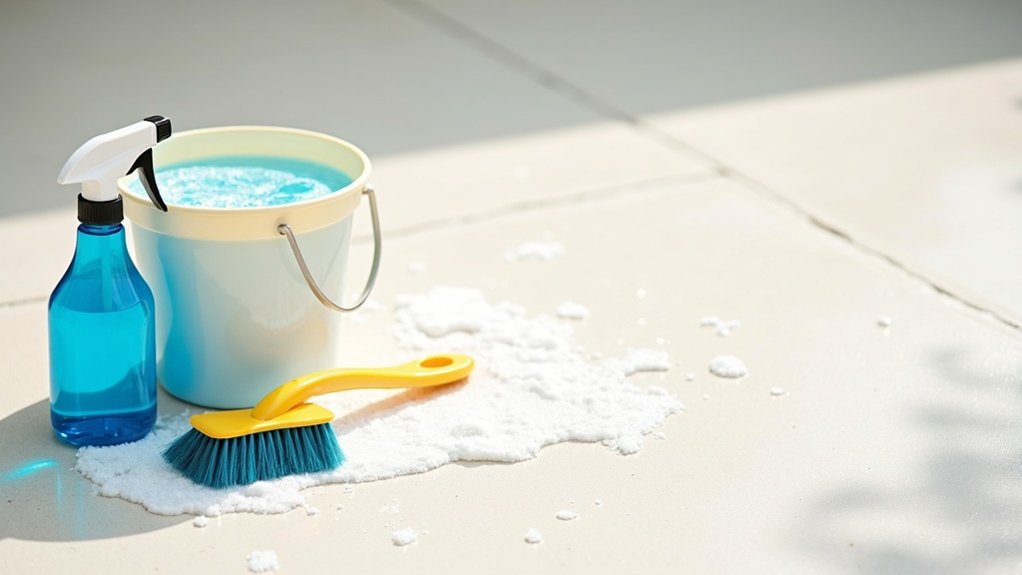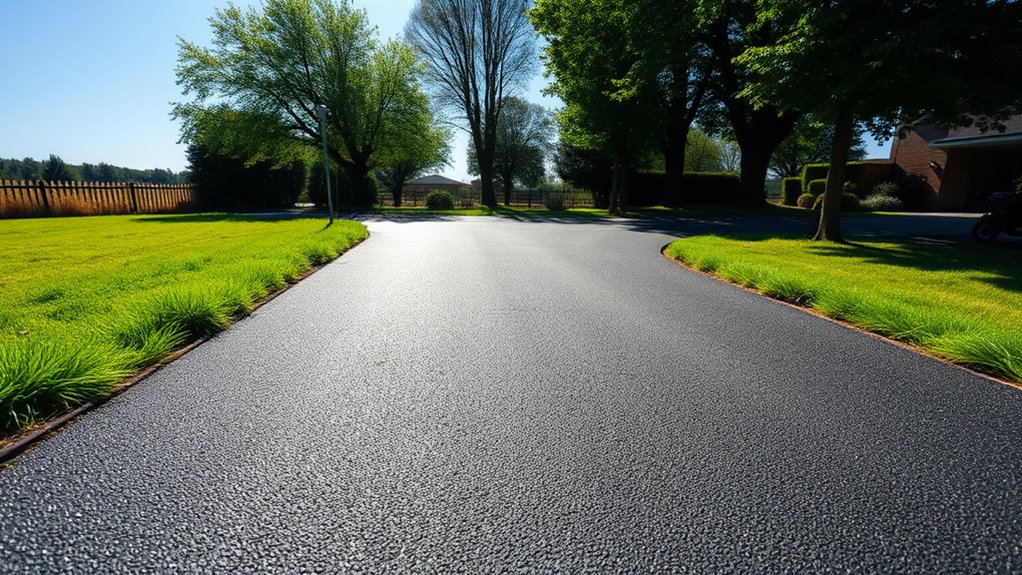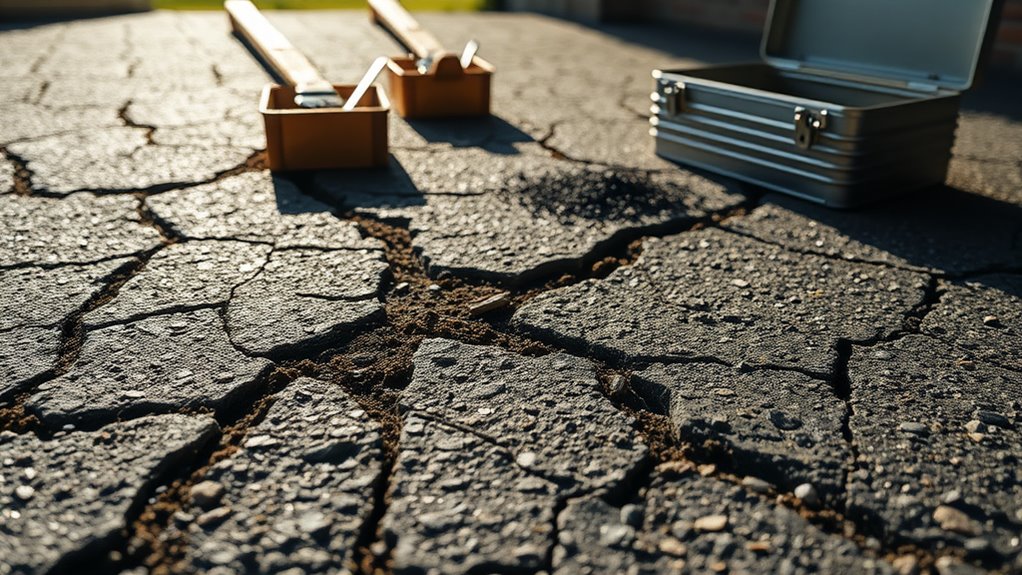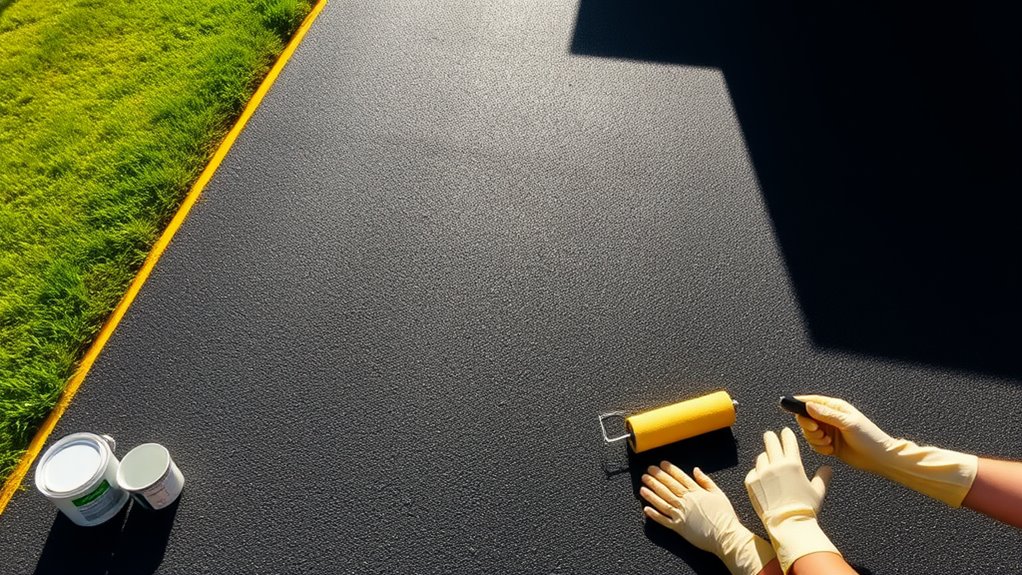For the best cleaning products for concrete driveways, consider liquid cleaners that effectively tackle grease and grime, as well as microbial cleaners for organic stains. Products like CAF Eximo or CC501 Heavy Duty Cleaner are excellent for removing tough marks. Sodium hypochlorite is effective against algae, while alkaline cleaners gently lift oil stains. For the best results, combine these products with pressure washing and scrubbing. Learn more about selecting the right cleaner and methods to help maintain your driveway’s longevity.
Table of Contents
ToggleKey Takeaways
- CAF Eximo Waterless Concrete Cleaner uses microbes to eco-friendlily remove oil stains without harming the surface.
- Sodium hypochlorite bleach effectively eradicates algae and mould, particularly when paired with a pressure washer.
- CC501 Heavy Duty Concrete Cleaner is suitable for tackling both stubborn home and commercial stains, delivering excellent results.
- Oil Eater is great for grease removal, while Simple Green provides a non-toxic option for safer cleaning.
- Green Building Supply cleaner is well-regarded for its robust performance and environmentally safe formulation.
Types of Concrete Driveway Cleaners
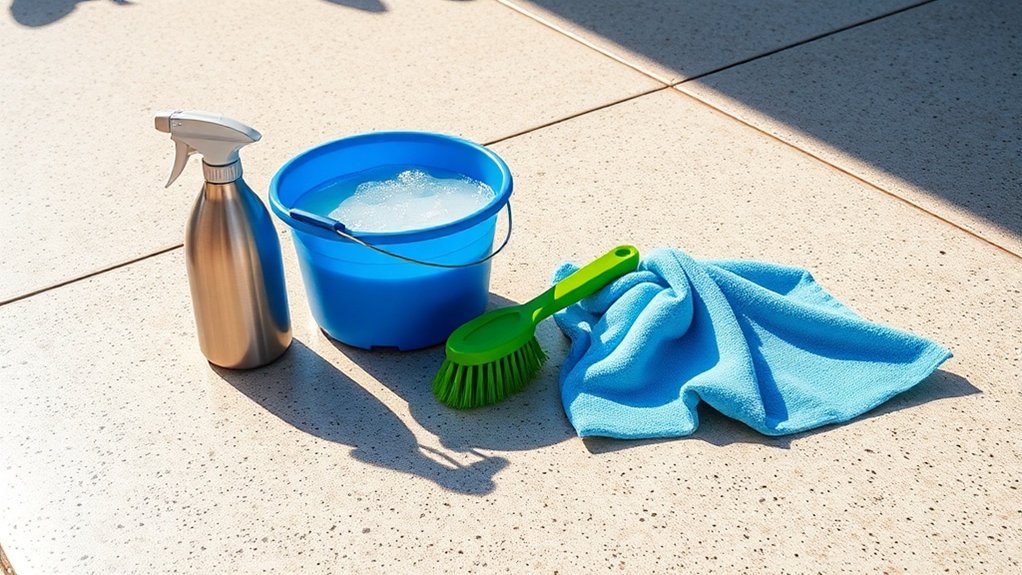
When it comes to cleaning concrete driveways, there are various cleaners available, each suited for different cleaning tasks.
Liquid cleaners are usually concentrated and need dilution before use. You can apply them with a spray, brush, or mop to effectively tackle grease, oil, and grime. These cleaners often contain alkaline ingredients that break down oily stains, and you’ll need to rinse the surface afterwards to remove any residue.
On the other hand, microbial cleaners use living microbes or enzymes to break down organic stains, offering an environmentally friendly option. They penetrate deep into the concrete, making them effective for stubborn, ingrained stains. Although they might require several applications, their biodegradable nature means they’re kinder to the environment, making them a great choice for eco-conscious homeowners. Additionally, many cleaners conduct deep-cleaning without damaging concrete, ensuring a thorough clean while preserving the surface integrity.
Key Cleaning Agents and Their Properties
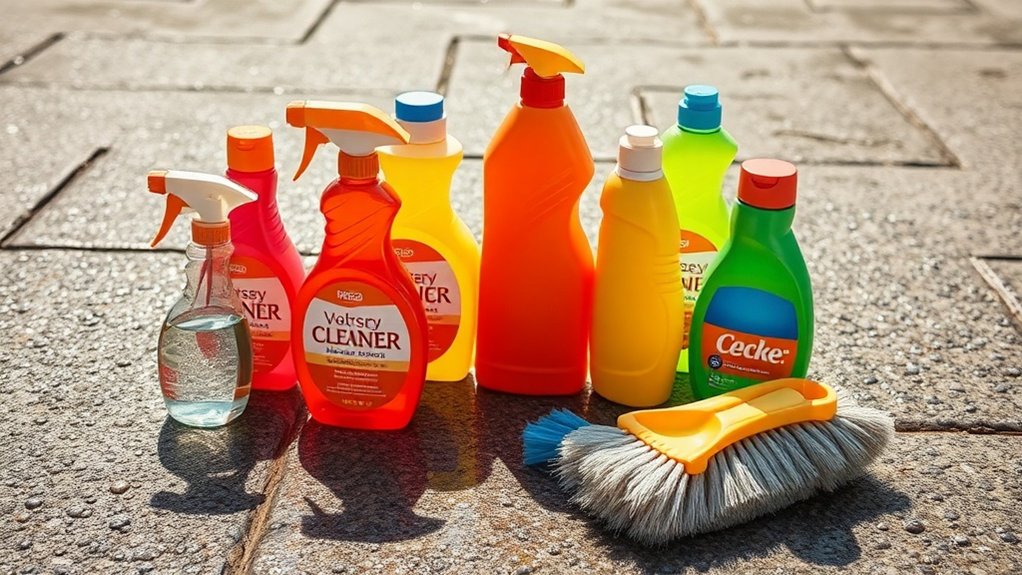
Understanding key cleaning agents and their properties is vital for maintaining your concrete driveway effectively.
Sodium hypochlorite, commonly known as bleach, is highly effective against algae and mould but must be handled with care to avoid damaging the surface. Using 12.5% sodium hypochlorite diluted to the appropriate ratio can significantly enhance cleaning efficiency.
Alkaline cleaners are great for removing oil and grease, making them safer for concrete with a lower risk of etching.
Acid-based cleaners can effectively tackle mineral deposits but may etch surfaces if not properly neutralised, so caution is essential.
Enzyme and bacteria-based cleaners offer a gentle, eco-friendly option that breaks down organic stains without harsh chemicals, although they may take longer to work.
Lastly, surfactants and detergents improve penetration and emulsification, ensuring a uniform clean without leaving patchy residues, which is crucial for your driveway’s longevity.
Popular Commercial Products and Their Features
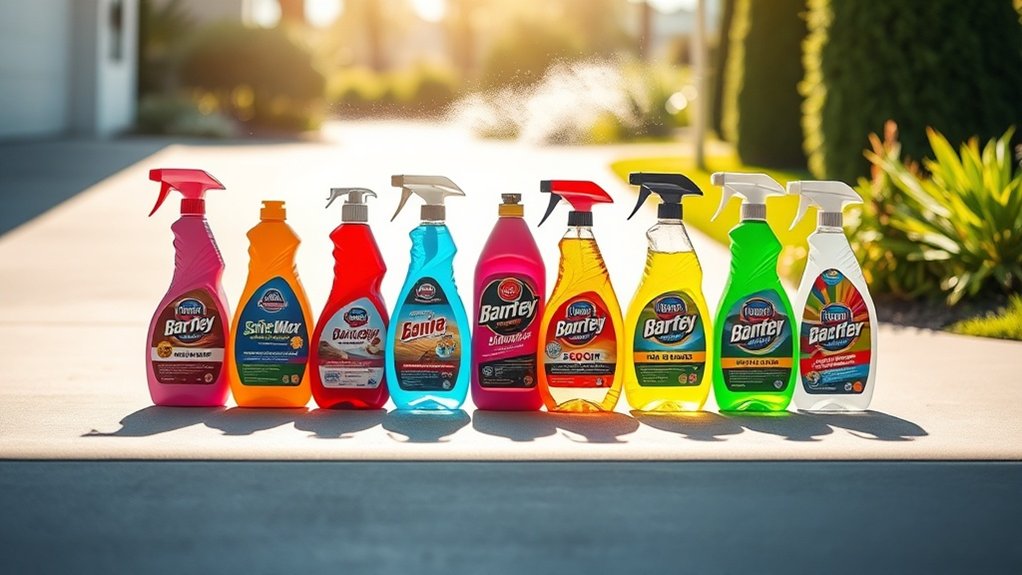
Once you’ve got a handle on key cleaning agents and their properties, let’s look at some specific commercial products for cleaning concrete driveways.
The CAF Eximo Waterless Concrete Cleaner uses microbes to eliminate hydrocarbon stains and is eco-friendly, making it safe for everyone.
For more industrial-strength cleaning, sodium hypochlorite bleach is ideal for removing algae and mould, particularly when used with a pressure washer.
If you’re dealing with stubborn grime, the CC501 Heavy Duty Concrete Cleaner is a concentrated option suitable for both home and commercial use, as it is designed to remove tough stains such as dirt, grease, and rust.
In comparisons, Oil Eater is particularly effective at cutting through grease, while Simple Green is a great non-toxic alternative.
Users have praised the cleaner from Green Building Supply for its ability to tackle a variety of contaminants, highlighting its heavy-duty performance and versatility.
Application Methods for Optimal Cleaning
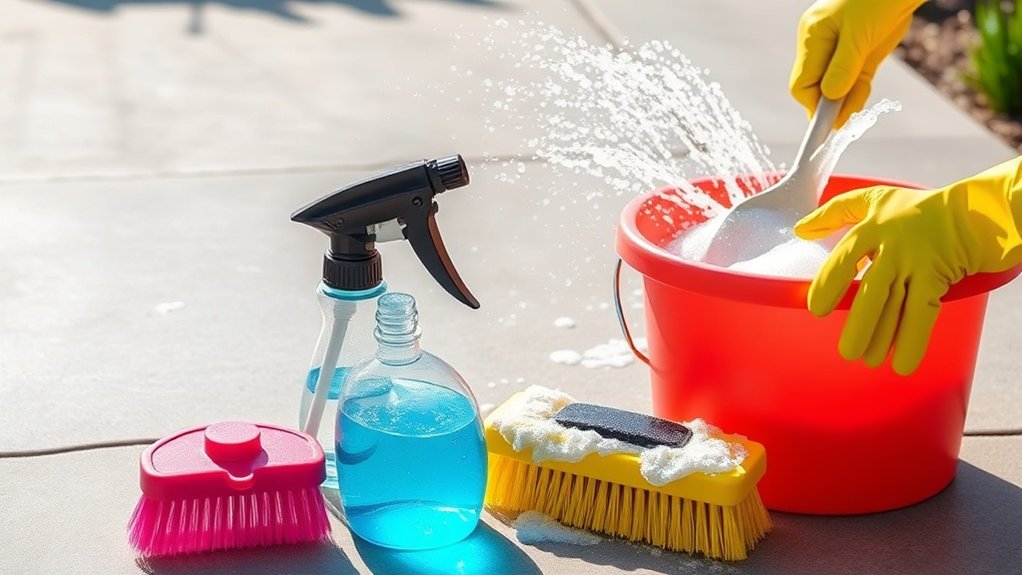
For optimal cleaning of your concrete driveway, it’s crucial to use effective application methods.
Begin by sweeping away loose debris to improve cleaning results. Pre-wet the concrete to loosen dirt, and for tougher stains, apply a suitable commercial cleaner beforehand.
Use a stiff nylon-bristle brush for manual scrubbing, working in sections of about 1.5 metres, and rinse thoroughly before moving on.
For larger areas, pressure washing is a quick and effective option; choose the right nozzle based on the severity of the stains and keep a consistent distance from the surface. Surface cleaner attachments can help ensure even pressure and coverage.
Finally, make sure all residues are rinsed off completely, and allow the driveway to dry fully before applying any protective sealants.
Safety and Environmental Considerations
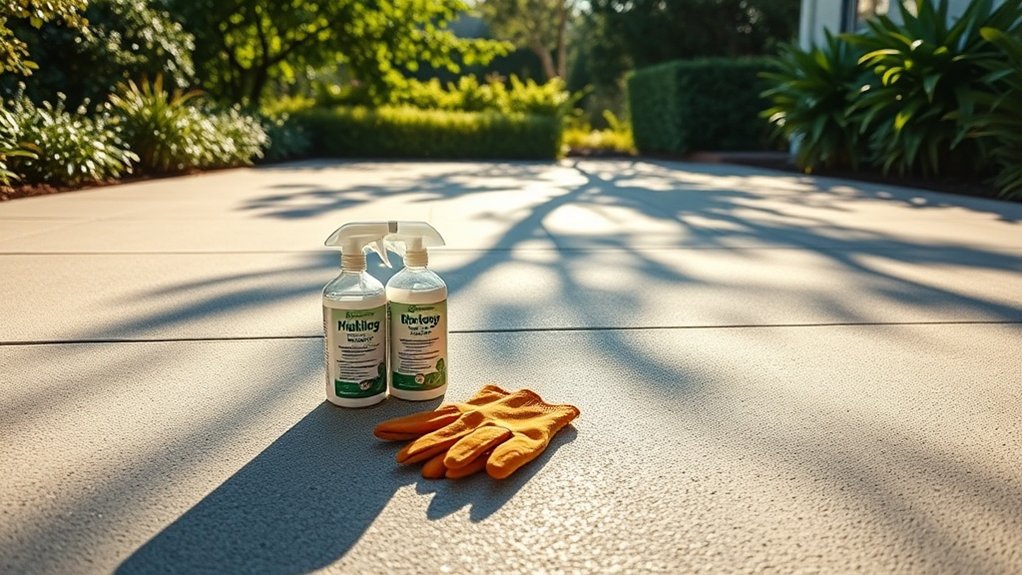
When cleaning your concrete driveway, it’s important to consider safety and environmental impacts.
Traditional cleaning methods often use harsh chemicals, such as ammonia and solvents, which can run off into the soil and waterways, harming wildlife and potentially contaminating drinking water.
Instead, opt for eco-friendly cleaners made from biodegradable, non-toxic ingredients. These cleaners effectively tackle stains without leaving behind toxic residues.
Additionally, practice proper water management while power washing to minimise runoff and pollution.
Frequently Asked Questions
How Often Should I Clean My Concrete Driveway?
You should clean your concrete driveway once or twice a year, ideally during the spring and autumn. If you live in a humid area or have a busy household, consider cleaning it every 3-4 months to prevent dirt and grime from building up. For instance, if you notice moss or stains, it’s a good sign that it’s time for a clean.
Can I Use Bleach on My Concrete Driveway?
You can use bleach on your concrete driveway to tackle stubborn stains, but be careful. While it can be effective, it may also cause surface damage and increase porosity, leading to long-term issues. Always dilute the bleach and rinse it off thoroughly afterwards.
What Is the Best Time of Year to Clean Concrete?
The best time to clean concrete is during the warm, dry months, typically from March to November. It’s important to consider seasonal factors like temperature and weather, as these can affect the cleaning process and help prevent damage to the surface. For example, cleaning on a sunny day ensures that the surface dries quickly, reducing the chance of dirt and grime setting in.
Do I Need to Seal My Driveway After Cleaning?
Yes, sealing your driveway after cleaning helps extend its lifespan by providing a protective barrier against water, stains, and UV damage. This not only safeguards your investment but can also significantly lower future repair costs. For instance, a well-sealed driveway can prevent cracks and deterioration caused by British weather, saving you time and money in the long run.
Are There Any DIY Concrete Cleaners That Work Well?
A simple homemade cleaner for concrete is a mixture of baking soda and vinegar. This eco-friendly solution produces a foaming action that effectively lifts dirt from your driveway, making it a safe choice for your outdoor surfaces.
Conclusion
When it comes to maintaining concrete driveways, selecting the right cleaning products is essential. Just as a skilled tradesperson relies on the right tools, you need effective cleaners to bring out the best in your driveway. With the appropriate products and techniques, your driveway can look as good as new. Remember, investing in quality cleaning agents not only improves the appearance but also extends the lifespan of your concrete surface.
Maximize the durability of your tarmac driveway by understanding the ideal weather conditions for installation—discover the secrets to perfect timing Read more
Discover the common causes of tarmac driveway cracks and learn effective repair methods to protect your investment—your driveway deserves the Read more
Before you paint your tarmac driveway, discover essential tips and techniques that can transform its appearance and durability—don't miss out Read more

